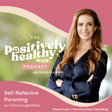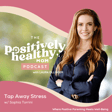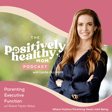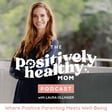
Healthy Meal Prep
Welcome to The Positively Healthy Mom Podcast! I'm Laura Ollinger, and today, I’m excited to welcome Marquelle Brown, a nutritionist and meal prep expert. Marquelle is here to share valuable tips on how busy moms can make healthy meal prep a breeze.
In this enlightening episode, Marquelle explores the essential role of meal prepping—not just as a time-saver, but as a game-changer for ensuring balanced, nutritious meals throughout the week. Marquelle’s journey into nutrition began with a mission to make healthy eating both accessible and sustainable for everyone, particularly for busy moms.
Marquelle walks us through practical strategies for planning and preparing meals ahead of time. She covers everything from selecting the right ingredients and efficient grocery shopping tips to organizing your kitchen for success. Marquelle’s advice includes how to prepare quick and well-rounded meals—think steamed vegetables, salads, or fruits on the side—that you can whip up in just about half an hour. She also emphasizes creating meal prep routines that cater to your family’s dietary needs and preferences, making healthy eating both enjoyable and stress-free.
For our listeners, Marquelle provides invaluable insights on involving your kids in the meal prep process, turning it into a fun and educational activity. She shares how healthy meal prep can transform your family’s health and well-being, helping you to avoid common pitfalls like frequent illnesses, joint pain, and fatigue.Marquelle’s story is one of transformation.
She and her family have embraced a lifestyle of balanced nutrition and mindful eating, which has brought them vitality and joy. Today, Marquelle leads nutrition workshops, helping others achieve the same benefits through practical meal prep and healthy eating habits.
Key takeaways from this episode include:
- The impact of nutrition on overall well-being and how meal prep can support a healthy lifestyle.
- Involving the whole family in meal prep to make it a collaborative, educational experience.
- Practical tips for staying consistent with meal prep, even on busy days, and making it an enjoyable routine.
- Building a new, healthy identity through mindful eating and creating sustainable habits for long-term wellness.
Join us for this insightful conversation and discover how Marquelle’s expertise and passion for nutrition can inspire and guide you toward nurturing your family with wholesome, delicious meals
Positively Healthy
The Positively Healthy Mom FB Group





